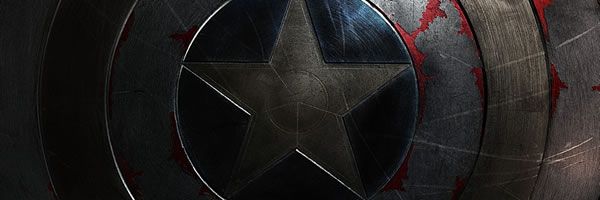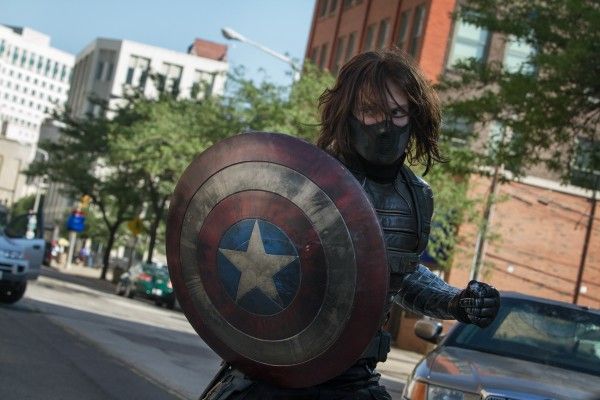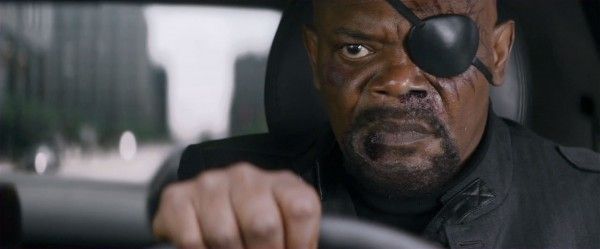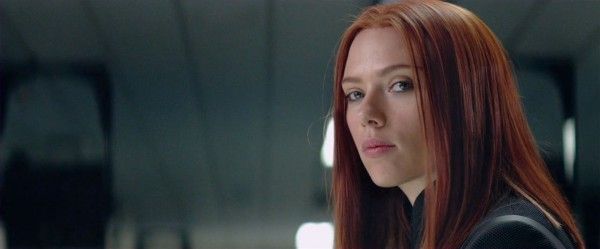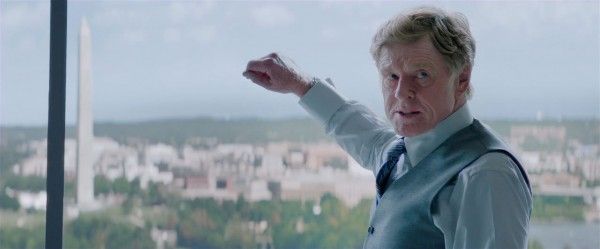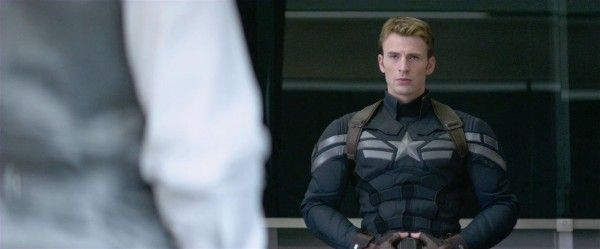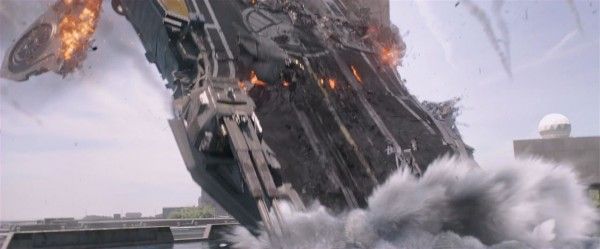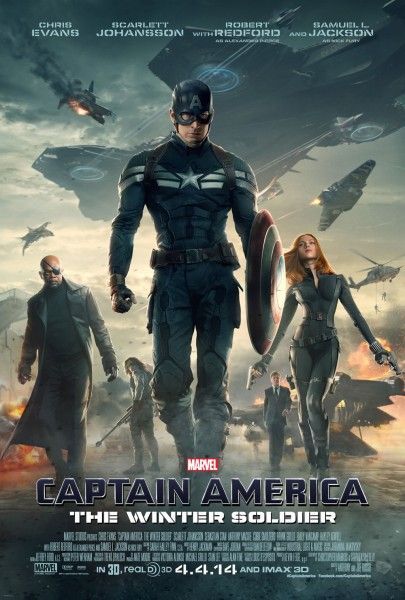[This is a re-post of my retrospective series in which I take a look back at the Marvel Cinematic Universe. These articles do not contain spoilers for unreleased Marvel movies. If you know any spoilers about the unreleased Marvel movies, please do not post them in the comments section.]
Iron Man 3 and Thor: The Dark World both avoided the MCU. Captain America: The Winter Soldier irrevocably changed it. It’s the first and only standalone Phase Two movie to reshape the future of the MCU, and it did so by building on the past. It not only found the right character in Captain America (Chris Evans), but it paired him with Black Widow (Scarlett Johansson), which showed a continuation of a partnership formed in The Avengers rather than scuttling her away back to the Iron Man movies or just keeping her in stasis for Avengers: Age of Ultron. And although the film didn’t directly address a fear of other superheroes, it showed that S.H.I.E.L.D. hadn’t changed since Avengers. They were still building weapons, and it was under the auspices of defense rather than offense.
That problem—weapons being defensive rather than offensive—is perfect for Captain America, whose signature weapon is his shield, which is a symbol of protection. Although the movie delves into the challenge of personal privacy versus security, the real conflict is about how to protect other people. The Winter Soldier stresses throughout that Captain America may be a super soldier, but he’s not a weapon. He makes his own judgment calls and he gets upset when he learns that his opening mission was partially a cover to get intel. Weapons are used, and Steve Rogers refuses to be S.H.I.E.L.D.’s weapon.
Contrast Cap against the Winter Soldier (Sebastian Stan). Although the movie spends most of its time bringing him around as an occasional antagonist who eventually provides some personal stakes for Rogers, the Winter Soldier is far more effective as a symbol in the larger milieu of the story. Steve is still trying to find his place in the world and trying to understand how America has changed. Bucky, by comparison, has lost his identity completely. HYDRA has reduced him to nothing but a mindless weapon. He’s as destructive and unthinking as the helicarriers HYDRA wants to put in the air.
While the similarity between Captain America and Winter Soldier yet again throws us another “dark mirror” antagonist, at least time there’s thematic underpinnings, and screenwriters Christopher Markus and Stephen McFeely and directors Anthony and Joe Russo work hard to try and put the central themes wherever they can, which is admirable. To be fair, most Marvel movies aren’t actively about something or even carry a detailed tone into every facet of the plot. That’s not a slam against other MCU pictures, but part of the reason The Winter Soldier receives acclaim is because it went further than its predecessors in trying to add something real to the superhero fantasy.
The Winter Soldier is consistently clever and I still admire how the Nick Fury (Samuel L. Jackson) chase scene and the elevator fight don’t just look good, but they also represent paranoia as well as threats posing as protection (cops in the Fury chase and fellow “S.H.I.E.L.D.” agents in the elevator fight). It’s a rare instance in not only the MCU but in any action movie where the set pieces carry subtext.
The Russos throw in all sorts of subtle nods that S.H.I.E.L.D. is polluted and that Cap is working for people whose actions go beyond the morally questionable. The S.H.I.E.L.D. emblem is no longer curvy, but has straight-edged, militaristic lines. Cap’s new uniform has lost the red and white and gone to blue-and-silver. In the opening action scene to recapture the S.H.I.E.L.D. vessel, Captain America’s shield has lost its luster and color. Captain America the symbol is being turned into a weapon, and it’s only the man—Steve Rogers—that’s keeping him a free thinking individual who questions his superiors and voices his disgust with their actions.
The reason Captain America can’t be plunged into moral doubt and self-decay is because this is the fight of the idealist. It helps when you have a pragmatist like Black Widow in tow to help tackle the trickier aspects of the job (nothing in their mission is “dirty”, but she understands duplicity in a way Cap never will), but he’s incorruptible, and his steadfast nature helps ground the rest of the movie. His belief in a black-and-white nature of good and evil helps highlight the moral grey areas surrounding him.
Ultimately, the movie has to turn those greys to black and firmly establish that yes, the statement espoused by villain Alexander Pierce (Robert Redford), “Save 7 billion by sacrificing 20 million,” is wrong. The movie also points out that American foreign policy post-WWII has been dictated by using force to push things in a desired direction. It may not be the CIA trying to depose Middle Eastern leaders who stand in the way of our need for oil, but there’s a clear similarity with HYDRA using the Winter Soldier to adjust history that isn’t going their way (there’s also a bit of “What if the Nazi scientists hired by America directly influenced domestic and foreign policy?”). Rhodey (Don Cheadle) may have told Tony (Robert Downey Jr.) that the Mandarin (Ben Kingsley) was an “American” problem, but that was nonsense. Captain America: The Winter Soldier, fittingly, is actually dealing with an American problem albeit within the confines of a superhero movie.
Captain America: The Winter Soldier was billed as Marvel tilting in the direction of a 70s-style conspiracy thriller, which showed the studio’s flexibility to tackle different genres while still using superheroes. Casting Redford wasn’t just nabbing a legendary actor; it was getting someone who represented a specific genre. Specifically, Redford’s presence is meant to recall Three Days of the Condor and its ilk.
But there’s a key difference between a blockbuster and the conspiracy thrillers The Winter Soldier would like to recall. The Russos’ films can make all the references and commentary it wants, but ultimately, it can never truly be in the vein of Three Days of the Condor because it’s too hopeful. True conspiracy thrillers, especially ones in the 1970s, drown in pessimism. The towering institutions are too big, and they will take out anyone who stops them. The Winter Soldier is an action film that says paranoia feeds violence, but all action scenes traffic in violence that’s mean to be exciting. True conspiracy thrillers fear violence because that violence always hurts the powerless.
The Winter Soldier is escapist fantasy, and Marvel doesn’t want anyone to walk out feeling bummed. Their solution is that an entire institution has to be torn down in order to save us all, which is a nice, unrealistic sentiment. Because S.H.I.E.L.D. has intermingled with HYDRA, it all has to go and all secrets have to become public a la Wikileaks. No one saves the world in a 70s political thriller. Resting the fate of the world on a handful of good people against a secret army is the escapism The Winter Soldier provides, and it does it incredibly well.
The movie also provides the first true shakeup of the MCU. S.H.I.E.L.D. isn’t focused on stopping another alien attack or even says something along the lines of “Hey, you know that powerful scepter Loki had? Where’d we put that thing?” The movie looks at threats on our own planet, but the act of bringing down S.H.I.E.L.D., which had been a part of the MCU since the beginning, was still huge.
Granted, the climax leading up to it is just a larger version of what happened in Captain America: The First Avenger. There’s more happening, but Captain America is still fighting a twisted version of himself, he’s doing it in a flying vessel, and he has to stop the bad guy before the vessel destroys America. The climax ends in the Phase Two way: a giant thing comes crashing down to the planet’s surface.
Nevertheless, Captain America: The Winter Soldier is admirable in a variety of ways, and it’s the only MCU movie to really change the face of everything, from the future of the movies to a low-rated TV series. Iron Man 3 and Thor: The Dark World are fun movies, but they don’t take chances with the uniqueness of the MCU. There’s a minor reference here and there, but no major consequences. Now the MCU had seen its superheroes avoid, leave, and bring down the system. The next MCU movie would ask, “What the hell are superheroes?”
Previous Entries:
- Iron Man
- The Incredible Hulk
- Iron Man 2
- Thor
- Captain America: The First Avenger
- The Avengers
- Iron Man 3
- Thor: The Dark World

